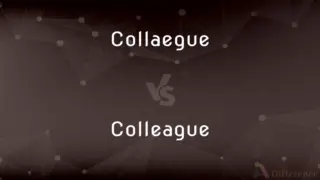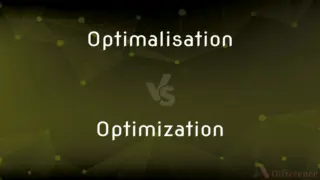Afterwhich vs. After Which — Which is Correct Spelling?
Edited by Tayyaba Rehman — By Fiza Rafique — Updated on March 26, 2024
"Afterwhich" is an incorrect spelling. The correct form is "after which," a conjunctional phrase referring to a previous item or situation.

Table of Contents
Which is correct: Afterwhich or After Which
How to spell After Which?

Afterwhich
Incorrect Spelling

After Which
Correct Spelling
ADVERTISEMENT
Key Differences
Whenever you use "after," pause a beat, then decide if "which" follows.
Think of "after" as a preposition and "which" as a question word. They need space to breathe.
Remember that "after" and "which" are both standalone words.
Break it down: there's something "after," then you ask "which" one.
Visualize a scenario, then question it: "After" the movie, "which" one do we watch next?
ADVERTISEMENT
How Do You Spell After Which Correctly?
Incorrect: She looked for her book afterwhich she remembered she left it at school.
Correct: She looked for her book after which she remembered she left it at school.
Incorrect: He wondered afterwhich train to take.
Correct: He wondered after which train to take.
Incorrect: The lecture concluded, afterwhich questions were encouraged.
Correct: The lecture concluded, after which questions were encouraged.
Incorrect: The meeting ended, afterwhich they went for lunch.
Correct: The meeting ended, after which they went for lunch.
Incorrect: We watched the movie, afterwhich we discussed its themes.
Correct: We watched the movie, after which we discussed its themes.
After Which Definitions
After which denotes the next occurrence following a stated event.
She graduated college, after which she traveled abroad.
After which introduces a subsequent event or situation in a sequence.
The storm hit the town, after which the power went out.
After which can lead to a result or consequence of a prior action.
He apologized, after which they reconciled.
After which signifies a chronological order of events.
The play starts at 7 pm, after which there's a short intermission.
After which is used to reference an event previously mentioned.
He read the book, after which he felt inspired.
After Which Meaning in a Sentence
The players celebrated their win, after which they thanked their fans.
After which, we decided to explore the city further.
After which, the chef demonstrated how to decorate a cake.
He asked me to call him after which he would give me the directions.
She finished her painting, after which she cleaned her brushes.
The children played outside, after which they came in for dinner.
She read the book, after which she wrote a review.
They completed the project, after which they presented it to the class.
The documentary ended, after which there was a discussion about its content.
After which, the teacher assigned homework to the class.
After which, the committee reviewed all the applications.
After which, the scientist explained the experiment's results.
The concert ended late, after which everyone hurried to catch the last train.
After which, the tour guide explained the history of the castle.
After which, we gathered around the campfire to tell stories.
The discussion was intense, after which a decision was finally made.
After which, she showed us her collection of vintage postcards.
After which, the family went on a picnic in the park.
He finished his exercise routine, after which he took a long shower.
The meeting was productive, after which tasks were assigned to everyone.
After which, the gardener planted new flowers in the garden.
The movie was sad, after which we all felt a bit melancholy.
After which, the students took a short break before returning to their lessons.
After which, they all went out for ice cream.
The puzzle was challenging, after which we felt proud of completing it.
Common Curiosities
What is the verb form of after which?
"After which" does not have a verb form.
What is the root word of after which?
"After" and "which" are individual words with no shared root.
Which vowel is used before after which?
Context-dependent, but often "a" as in "an event after which."
Which preposition is used with after which?
"After" is itself a preposition.
What is the pronunciation of after which?
Pronounced as /ˈæftər wɪʧ/.
Why is it called after which?
It's a conjunctional phrase connecting a previous event or item to a subsequent one.
Which article is used with after which?
Typically no specific article, but context might demand "the."
Is after which a negative or positive word?
Neutral.
What is the singular form of after which?
"After which" doesn't have singular or plural forms.
What is the plural form of after which?
"After which" remains the same; it doesn't have plural.
Is after which an adverb?
No.
Is after which an abstract noun?
No.
Is after which a collective noun?
No.
Which conjunction is used with after which?
"Which" can function as a conjunction, so the phrase itself is conjunctive.
Is the word after which imperative?
No.
Is the after which term a metaphor?
Not inherently.
How many syllables are in after which?
Three.
How do we divide after which into syllables?
Af-ter which.
What is the first form of after which?
Not applicable, as "after which" isn't a verb.
What is the third form of after which?
Not applicable.
What is a stressed syllable in after which?
The first syllable, "Af-."
What is another term for after which?
"Subsequent to."
What is the opposite of after which?
"Before which."
Is after which a vowel or consonant?
"After which" is a phrase, not a single letter. But it begins with a vowel sound.
Is after which a countable noun?
No.
How is after which used in a sentence?
"He gave a speech, after which there was a standing ovation."
Is after which a noun or adjective?
Neither. It's a conjunctional phrase.
What part of speech is after which?
It's a conjunctional phrase.
Which determiner is used with after which?
Determiners are context-dependent. For example, "the event after which."
What is the second form of after which?
Not applicable.
Share Your Discovery

Previous Comparison
Collaegue vs. Colleague
Next Comparison
Halleluyah vs. HallelujahAuthor Spotlight
Written by
Fiza RafiqueFiza Rafique is a skilled content writer at AskDifference.com, where she meticulously refines and enhances written pieces. Drawing from her vast editorial expertise, Fiza ensures clarity, accuracy, and precision in every article. Passionate about language, she continually seeks to elevate the quality of content for readers worldwide.
Edited by
Tayyaba RehmanTayyaba Rehman is a distinguished writer, currently serving as a primary contributor to askdifference.com. As a researcher in semantics and etymology, Tayyaba's passion for the complexity of languages and their distinctions has found a perfect home on the platform. Tayyaba delves into the intricacies of language, distinguishing between commonly confused words and phrases, thereby providing clarity for readers worldwide.









































